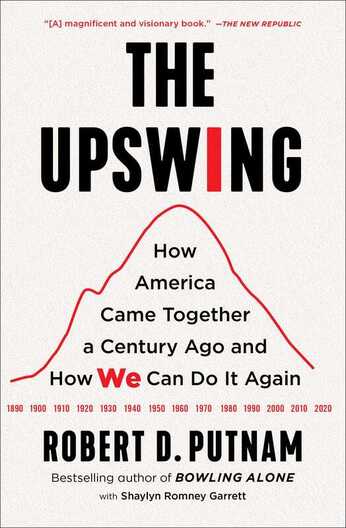PACG Book Club - The Upswing: How America Came Together a Century Ago and How We Can Do It Again
Monday, April 15th at 5:15 pm - hybrid meeting
Edwards Congregational UCC
3420 Jersey Ridge Rd
Davenport, IA (map)
PACG Book Club
For April we will read and discuss The Upswing: How America Came Together a Century Ago and How We Can Do It Again by Robert D. Putnam. I became interested in this author's work after seeing the documentary Join or Die at the Figge, hosted by Clock, Inc. Building community, as addressed by his life's work, is also central to our work at PACG.
Here is more information from Goodreads: An eminent political scientist’s brilliant analysis of economic, social, and political trends over the past century demonstrating how we have gone from an individualistic “I” society to a more communitarian “We” society and then back again—and how we can learn from that experience to turn the corner towards a stronger, more unified nation, from the author of Bowling Alone and Our Kids.
Deep and accelerating inequality; unprecedented political polarization; vitriolic public discourse; a fraying social fabric; public and private narcissism—Americans today seem to agree on only one thing: This is the worst of times.
But we’ve been here before. During the Gilded Age of the late 1800s, America was highly individualistic, starkly unequal, fiercely polarized, and deeply fragmented, just as it is today. However as the twentieth century opened, America became—slowly, unevenly, but steadily—more egalitarian, more cooperative, more generous; a society more focused on our responsibilities to one another and less focused on our narrower self-interest. Sometime during the 1960s, however, our nation turned another corner, and all of these trends reversed, leaving us in today’s disarray.
In a sweeping overview of more than a century of history, drawing on his inimitable combination of statistical analysis and storytelling, Robert Putnam analyzes a remarkable confluence of trends that brought us from an “I” society to a “We” society and then back again. He draws inspiring lessons for our time from an earlier era, when a dedicated group of reformers righted the ship, putting us on a path to becoming a society once again based on community. Engaging, revelatory, and timely, this is Putnam’s most ambitious work yet, a fitting capstone to a brilliant career.
Contact me for the Zoom link if you are coming that way.
Alta Price


 RSS Feed
RSS Feed


